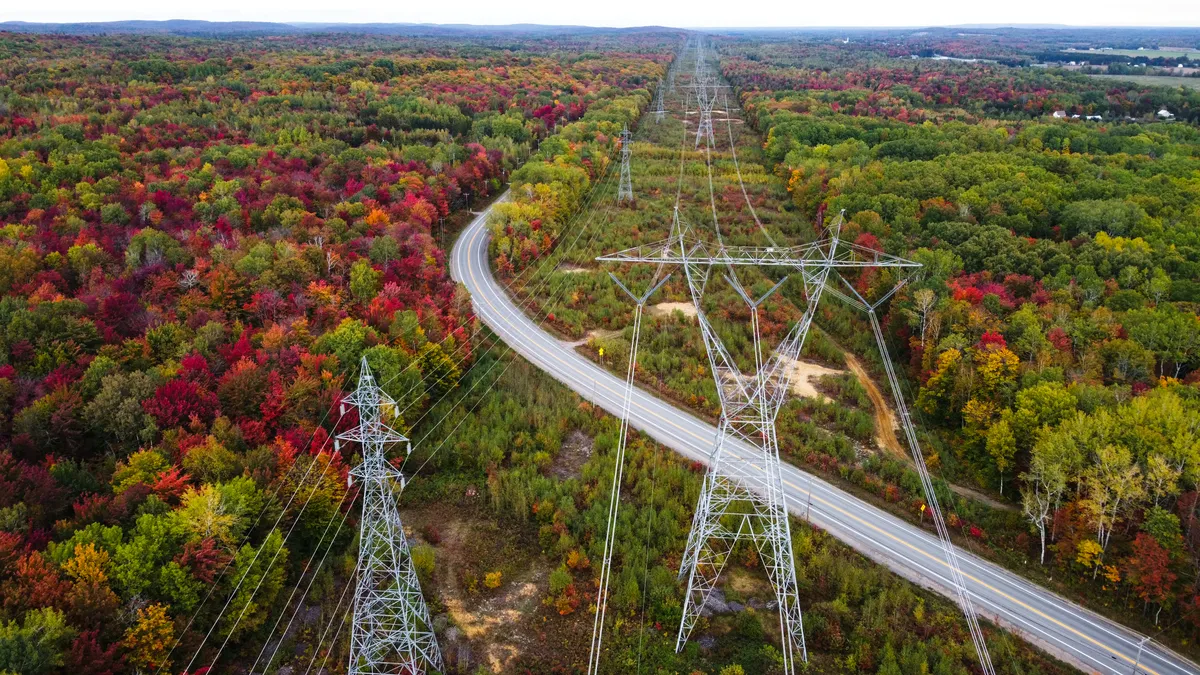Dive Brief:
-
Avangrid can move ahead with its New England Clean Energy Connect transmission line if the company shows it engaged in “substantial” construction on the project before Maine voters approved a ballot initiative last year blocking the effort, the state’s highest court ruled Monday.
-
Retroactively applying the new law to Avangrid’s roughly $1 billion project violates Maine’s constitution if Avangrid had already started building the transmission line, triggering the company’s “vested rights” in the endeavor, according to the Maine Judicial Supreme Court.
-
The case was remanded to a lower court to decide if Avangrid meets the conditions for having the right to build the transmission line in western Maine; other legal challenges remain.
Dive Insight:
Avangrid has faced multiple hurdles to its NECEC project, a proposed 145-mile power line in Maine that would deliver 9.45 million MWh a year from Hydro-Québec to Massachusetts utilities.
In November, about 59% of Maine voters approved a ballot measure that effectively blocked the partly-built project, in part by banning major transmission lines from the area where the project would run. The law applies to projects, including NECEC, that hadn’t started construction by mid-September 2020.
NextEra Energy Resources, which owns about 2,495 MW of generation in New England, joined Vistra and Calpine in helping finance the roughly $100 million ballot fight, the most expensive in Maine history. The electricity from Hydro-Québec would increase power supplies in the ISO New England market, hurting the power generators’ bottom lines.
Earlier, the NextEra Energy subsidiary unsuccessfully tried to persuade the Massachusetts Supreme Judicial Court to reject the Hydro-Québec utility contracts.
Also, in a pending complaint at the Federal Energy Regulatory Commission, Avangrid and its NECEC Transmission subsidiary contend that Juno Beach, Florida-based NextEra is slow-walking a circuit breaker upgrade at the Seabrook nuclear plant in New Hampshire to block the transmission line. NextEra denies the allegations.
In 2020, the Maine Judicial Supreme Court rejected NextEra’s challenge to the Maine Public Utilities Commission’s approval of the NECEC line. When Avangrid appealed the ballot initiative, NextEra intervened in the case to defend the measure. NextEra has also appealed the Maine Department of Environmental Protection’s approval of the project.
Separately, NextEra Energy Transmission, an affiliate of NextEra Energy Resources, on Tuesday won a victory when a federal appeals court ruled a Texas law may be improperly barring the company from building a transmission line in that state.
In its Monday decision, the Maine Judicial Supreme Court ruled Avangrid could rely on the PUC’s approval of the NECEC project, and the court’s affirmation of that decision, as authorization to start building the project.
The company’s right to build the line cannot be taken away retroactively as long as the company shows it undertook “significant, visible construction in good faith, according to a schedule that was not created or expedited for the purpose of generating a vested rights claim,” the court said.
Avangrid seems to have met those conditions, but a trial court will make a decision on remand, according to the court.
”We are pleased with this outcome as we move Maine to a cleaner energy future,” Avangrid said in a statement Tuesday.
Avangrid started building the transmission project in January 2021 and stopped construction after the ballot initiative, the company said in a July 30 report with the Securities and Exchange Commission. Avangrid said it had spent about $575 million on the project as of June 30.
The NECEC project could start operating in December 2024 if construction restarts this year, Avangrid said.
The NECEC project is a poster child for how difficult it can be to build transmission lines in the United States, according to Larry Gasteiger, executive director of WIRES, a trade group for utilities, grid operators and other companies in the transmission sector.
“Today’s decision by the Maine Supreme Court will hopefully set the important NECEC project back on track, although with likely further delays,” Gasteiger said Tuesday in a statement. "Future projects need to be expedited — not face additional delays and risks — if we hope to have a chance of achieving our ambitious goals within a timetable that is becoming more urgent every day.”















